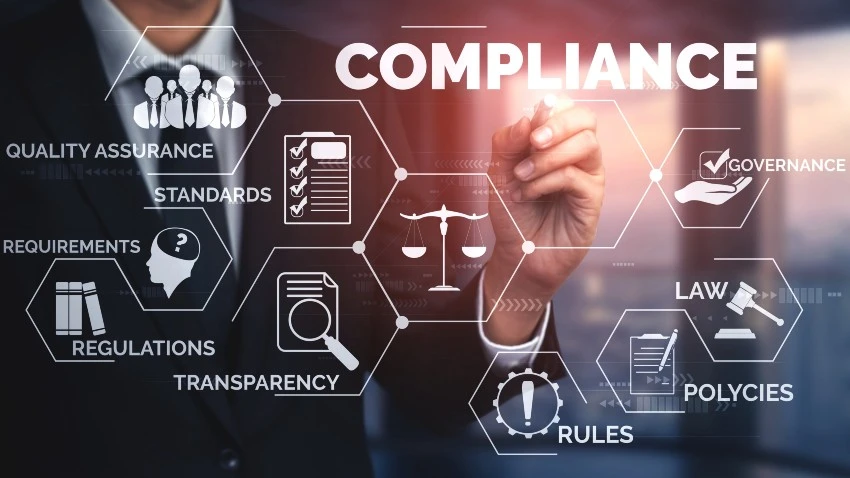Starting a new business is an exhilarating endeavor filled with potential and opportunity. However, amid the excitement, it’s crucial not to overlook the importance of compliance with business regulations. Understanding and adhering to these regulations is essential for ensuring the legal and financial stability of your startup. This guide aims to provide a comprehensive overview of business regulations that startups need to be aware of, helping entrepreneurs navigate the complex landscape of compliance.
Contents
Why Compliance Matters
Compliance with business regulations is not merely a legal requirement; it is a cornerstone of a sustainable and ethical business practice. Non-compliance can lead to severe penalties, including fines, lawsuits, and even the dissolution of the business. Moreover, adhering to regulations fosters trust with customers, investors, and partners, enhancing the startup’s reputation and credibility.
Key Areas of Business Regulations
- Business Structure and Registration
- Licensing and Permits
- Employment Laws
- Tax Compliance
- Health and Safety Regulations
- Environmental Regulations
- Data Protection and Privacy Laws
Intellectual Property Rights
1. Business Structure and Registration
Choosing the right business structure is the first step toward compliance. The structure you choose will determine your legal obligations, tax liabilities, and the level of personal liability you face. Common business structures include:
Sole Proprietorship: The simplest form, with the owner having full control and responsibility.
Partnership: Involves two or more people sharing profits, losses, and management responsibilities.
Limited Liability Company (LLC): Offers protection from personal liability with the benefits of partnership taxation.
Corporation: A more complex structure providing limited liability, but with more regulatory requirements.
Once you’ve chosen a structure, you must register your business with the relevant government authorities. This process typically involves:
- Choosing and registering a business name.
- Obtaining an Employer Identification Number (EIN) from the IRS.
- Registering with state and local agencies, as required.
2. Licensing and Permits
Depending on your industry and location, you may need various licenses and permits to operate legally. These can include:
General Business Licenses: Required by most local governments.
Industry-Specific Licenses: Such as those for restaurants, construction, or healthcare.
Home-Based Business Permits: Necessary if you operate from your home.
Zoning Permits: Ensure your business location complies with local zoning laws.
Researching and securing the necessary licenses and permits before commencing operations is crucial to avoid penalties and disruptions.
3. Employment Laws
As a startup, hiring employees brings additional regulatory responsibilities. Key employment laws to consider include:
Fair Labor Standards Act (FLSA): Governs minimum wage, overtime pay, and child labor.
Occupational Safety and Health Act (OSHA): Ensures workplace safety and health standards.
Equal Employment Opportunity (EEO) Laws: Prohibit discrimination based on race, color, religion, sex, or national origin.
Family and Medical Leave Act (FMLA): Provides eligible employees with unpaid, job-protected leave for family and medical reasons.
Additionally, you’ll need to understand regulations related to employee benefits, workers’ compensation, and unemployment insurance.
4. Tax Compliance
Tax compliance is a critical aspect of running a startup. It involves understanding and fulfilling your tax obligations at the federal, state, and local levels. Key considerations include:
Federal Taxes: Including income tax, self-employment tax, and employment taxes.
State Taxes: Vary by state and may include income tax, sales tax, and property tax.
Local Taxes: Such as business licenses and local sales taxes.
Maintaining accurate financial records and working with a tax professional can help ensure compliance and optimize your tax strategy.
5. Health and Safety Regulations
Ensuring a safe workplace is not only a legal requirement but also a moral obligation. Health and safety regulations aim to protect employees from workplace hazards. Key aspects include:
OSHA Standards: Covering a wide range of workplace safety issues, from machinery safety to hazardous substances.
Emergency Procedures: Establishing protocols for emergencies such as fires, medical incidents, and natural disasters.
Training and Education: Providing employees with the necessary training to perform their jobs safely.
Compliance with health and safety regulations helps prevent workplace injuries and illnesses, reducing liability and fostering a positive work environment.
6. Environmental Regulations
Environmental regulations are designed to protect the environment from business-related activities. Depending on your industry, you may need to comply with regulations related to:
Waste Management: Proper disposal of hazardous and non-hazardous waste.
Air and Water Quality: Emissions standards and discharge permits.
Chemical Storage and Handling: Safe storage and handling of chemicals to prevent spills and contamination.
Understanding and complying with environmental regulations can help avoid fines and contribute to sustainable business practices.
7. Data Protection and Privacy Laws
In the digital age, data protection and privacy have become paramount concerns for businesses. Key regulations to be aware of include:
General Data Protection Regulation (GDPR): Governs data protection and privacy in the European Union but affects businesses worldwide.
California Consumer Privacy Act (CCPA): Provides privacy rights to California residents.
Health Insurance Portability and Accountability Act (HIPAA): Protects sensitive health information.
Compliance with data protection and privacy laws involves implementing robust data security measures, obtaining consent for data collection, and ensuring the right to access and delete personal data.
8. Intellectual Property Rights
Protecting your startup’s intellectual property (IP) is essential for maintaining a competitive edge. Key IP considerations include:
Trademarks: Protect brand names, logos, and slogans.
Patents: Protect inventions and innovations.
Copyrights: Protect original works of authorship, such as software, designs, and publications.
Trade Secrets: Protect confidential business information.
Registering your IP and understanding how to enforce your rights can prevent unauthorized use and safeguard your business assets.
Building a Compliance Strategy
Developing a compliance strategy is crucial for managing the myriad regulations your startup must adhere to. Key steps include:
Conducting a Compliance Audit: Assess your current compliance status and identify gaps.
Creating a Compliance Plan: Develop a comprehensive plan to address identified gaps and ensure ongoing compliance.
Training and Education: Provide employees with regular training on compliance-related topics.
Monitoring and Updating: Regularly review and update your compliance strategy to reflect changes in regulations.
The Role of Technology in Compliance
Technology can play a significant role in streamlining compliance efforts. Tools and software solutions can help with:
Document Management: Organizing and storing compliance-related documents.
Reporting and Analytics: Generating reports to monitor compliance status and identify trends.
Automated Alerts: Notifying you of upcoming deadlines and regulatory changes.
Investing in compliance technology can reduce the administrative burden and enhance your ability to stay compliant.
Navigating the complex landscape of business regulations is a daunting task for any startup. However, understanding and adhering to these regulations is essential for building a sustainable and legally compliant business. By developing a robust compliance strategy, leveraging technology, and staying informed about regulatory changes, you can mitigate risks and focus on growing your startup. Remember, compliance is not just a legal obligation but a foundation for trust and credibility in the business world.


